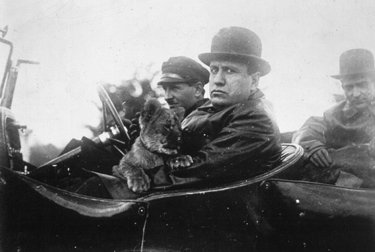
Benito Mussolini (1883 – 1945) going for a drive with his pet lion cub ‘Ras’, a gift from Aldo Finci.
Daniel Pipes has collected a number of comments on dictators and tyrants, demonstrating the propensity of Western establishment intellectuals to feel, Ã la Chris Matthews, “a thrill running up the leg” when in proximity to power.
Herbert Croly, founding editor of the New Republic, gushed over the ‘élan of Italian nationalism which…would enable Italians to master themselves through a renewal of moral vision’. He called fascism ‘a political experiment which aroused in a whole nation an increased moral energy and dignified its activities by subordinating them to a deeply felt common purpose’.
Arnold Toynbee, the influential world historian, interviewed the Führer in 1936 and reported being ‘convinced of his sincerity in desiring peace in Europe’.
Jerome Davis, a famed Yale Divinity School theologian, thought ‘it would be an error to consider the Soviet leader a willful man who believes in forcing his ideas upon others’.
John K. Fairbank, Harvard’s dean of American China scholars, asserted that ‘the Maoist revolution is on the whole the best thing that happened to the Chinese people in centuries,’ and concluded that Mao’s China ‘is much more our friend than our enemy. It is peculiarly self-absorbed and nonaggressive abroad.’
Edward Said, a university professor at Columbia, said the Palestinian leader ‘made the PLO a genuinely representative body’.
Richard Falk, a Princeton political scientist, judged that the Iranian ayatollah had created ‘a new model of popular revolution, based for the most part on non-violent tactics’. He went on to conclude that ‘Iran may yet provide us with a desperately needed model of human governance for a third-world country’.
Acclaimed novelist Norman Mailer flattered his Cuban host with ‘you were the first and greatest hero to appear in the world since the Second War…you are the answer to the argument…that revolutions cannot last, that they turn corrupt or total or they eat their own.’
University of Chicago historian Bruce Cumings depicts the North Korean dictator as ‘a homebody who doesn’t socialize much, doesn’t drink much and works at home in his pajamas… He most enjoys tinkering with his many music boxes, sitting on the floor… He is prudish and shy, and like most Korean fathers, hopelessly devoted to his son.’





A. Squaretail
Its not a question of smart in terms of IQ or intellectual horsepower, its a question of wisdom. Academics and intellectuals live in a fantasy world where ideas are interesting but have no concrete consequences. In the real world, ideas can kill. This is why, until the early 20th century, academics and intellectuals were kept out of position of power. Sure, they were allowed to talk to those in power and suggest ideas, but seldom given power. And then came Wilson and Roosevelt who chose to bring these childlike people into power. And people died. Just another set of atrocity that we can lay at the feet of “progressives.”
Mike-SMO
The same class who wailed, “If only Stalin knew…” Used up and thrown away.
Please Leave a Comment!